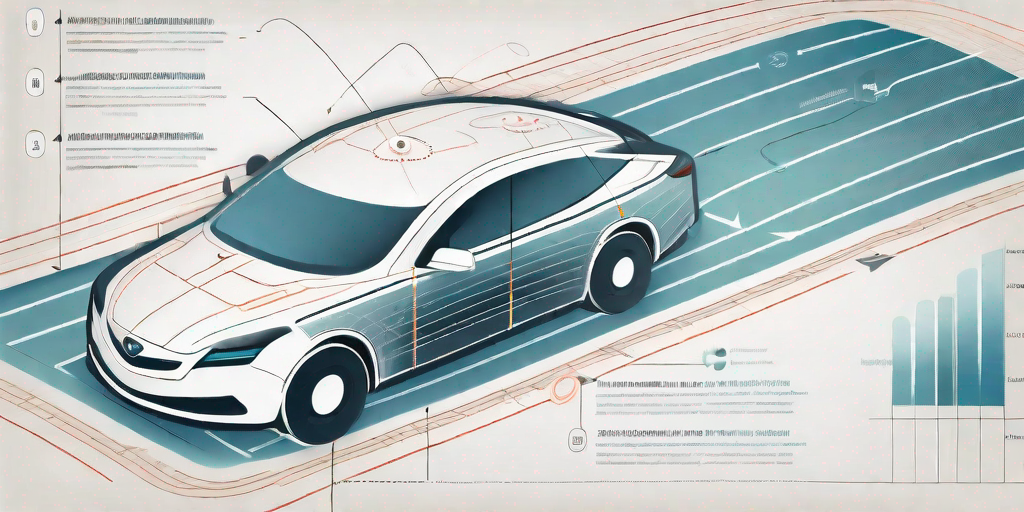Understanding Autonomous Vehicles with the Help of a Strategy Speaker

Understanding Autonomous Vehicles with the Help of a Strategy Speaker
Advancements in technology have revolutionized the automotive industry in various ways. One of the most significant developments in recent years is the rise of autonomous vehicles. These self-driving cars not only offer convenience and efficiency but also have the potential to transform the way we travel and live. However, the road to fully autonomous vehicles is not without its challenges. To understand the intricacies and implications of these vehicles, we turn to the insights and expertise of a strategy speaker.
Understanding the Future of Mobility: Autonomous Vehicles
The future of transportation is being shaped by the emergence of autonomous vehicles. These vehicles have the ability to navigate and operate without human intervention, thanks to advanced technologies such as sensors, artificial intelligence, and connectivity. They offer numerous advantages, including improved road safety, reduced traffic congestion, and enhanced mobility for individuals who cannot drive. However, there are still concerns and uncertainties surrounding their widespread adoption.
Autonomous vehicles have the potential to revolutionize the way we travel. Imagine a world where cars can communicate with each other and with traffic infrastructure, allowing for seamless coordination and efficient traffic flow. This could significantly reduce travel times and make commuting a much more pleasant experience.
Furthermore, autonomous vehicles have the potential to greatly improve road safety. Human error is a leading cause of accidents on the road, but with autonomous vehicles, this risk could be greatly reduced. These vehicles are equipped with advanced sensors that can detect obstacles, pedestrians, and other vehicles, allowing them to make split-second decisions to avoid collisions.
Another advantage of autonomous vehicles is their potential to increase accessibility for individuals who cannot drive. This includes people with disabilities, the elderly, and those who are unable to obtain a driver's license. With autonomous vehicles, these individuals would have the freedom to travel independently, opening up new opportunities for employment, education, and social engagement.
However, despite these potential benefits, there are still concerns and uncertainties surrounding the widespread adoption of autonomous vehicles. One of the main concerns is the issue of liability in the event of an accident. Who would be held responsible if an autonomous vehicle were to cause harm or damage? This is a complex legal and ethical question that needs to be addressed before autonomous vehicles can become a common sight on our roads.
Additionally, there are concerns about the potential impact on jobs. With autonomous vehicles, there is the possibility of job displacement for professional drivers, such as truck drivers and taxi drivers. While autonomous vehicles have the potential to create new jobs in areas such as vehicle maintenance and software development, it is important to consider the potential social and economic implications of this technological shift.
To gain a deeper understanding of the future of autonomous vehicles, it can be beneficial to seek the insights of a strategy speaker. These experts have a wealth of knowledge in technology, policy, and innovation, and can provide valuable insights into the potential opportunities and challenges that autonomous vehicles present. They can discuss the latest advancements in autonomous vehicle technology, the regulatory landscape, and the potential impact on various industries.
In conclusion, autonomous vehicles have the potential to revolutionize the way we travel, offering improved road safety, reduced traffic congestion, and enhanced mobility for individuals who cannot drive. However, there are still concerns and uncertainties that need to be addressed before widespread adoption can occur. Seeking the insights of a strategy speaker can provide valuable insights into the future of autonomous vehicles and help navigate the opportunities and challenges that lie ahead.
The Impact of a Strategy Speaker on Perceptions of Autonomous Vehicles
Autonomous vehicles are not just a technological feat; they also require a shift in societal perceptions and attitudes. People need to feel confident and trust in the capabilities of these vehicles for them to be widely accepted and embraced. A strategy speaker can play a crucial role in shaping these perceptions.
Through their knowledge and expertise, a strategy speaker can help bridge the gap between technology and public understanding. By addressing concerns related to safety, ethics, and job displacement, they can foster a more informed and positive perception of autonomous vehicles. Their ability to communicate complex ideas in a relatable and engaging manner makes them an invaluable resource in shaping public opinion and facilitating the adoption of autonomous vehicles.
One of the key areas where a strategy speaker can have a significant impact is in addressing safety concerns. Autonomous vehicles are still relatively new, and many people have reservations about their ability to navigate complex traffic situations. A strategy speaker can provide insights into the advanced safety features and technologies that are incorporated into these vehicles, reassuring the public that they are designed with their well-being in mind.
Moreover, a strategy speaker can also address ethical concerns surrounding autonomous vehicles. Questions about how these vehicles make decisions in life-threatening situations or who should be held responsible in case of accidents are common. By delving into the ethical frameworks and algorithms that guide the decision-making process of autonomous vehicles, a strategy speaker can help alleviate these concerns and promote a more nuanced understanding of the technology.
Another important aspect that a strategy speaker can address is the potential impact of autonomous vehicles on employment. Many people worry that the widespread adoption of autonomous vehicles will lead to job losses in industries such as trucking and taxi services. By discussing the potential for new job opportunities that arise from the development and maintenance of autonomous vehicles, a strategy speaker can help shift the narrative from fear to optimism, highlighting the potential for economic growth and innovation.
In addition to addressing specific concerns, a strategy speaker can also provide a broader context for understanding autonomous vehicles. They can discuss the history of technological advancements and societal shifts, highlighting how previous innovations have faced similar skepticism before becoming widely accepted. By drawing parallels to past experiences, a strategy speaker can instill confidence in the potential of autonomous vehicles and inspire a more open-minded approach towards embracing new technologies.
Furthermore, a strategy speaker can engage the audience by sharing real-life examples and success stories related to autonomous vehicles. They can showcase how these vehicles have already made a positive impact in areas such as transportation efficiency, reduction in accidents, and improved accessibility for individuals with disabilities. By highlighting these tangible benefits, a strategy speaker can create a sense of excitement and optimism, encouraging the audience to embrace the possibilities offered by autonomous vehicles.
In conclusion, the role of a strategy speaker in shaping perceptions of autonomous vehicles cannot be underestimated. Their knowledge, expertise, and ability to communicate effectively can help address concerns, provide context, and inspire confidence in the potential of this technology. By engaging with the public and fostering a more informed and positive perception, a strategy speaker can play a vital role in facilitating the widespread adoption and acceptance of autonomous vehicles.
Navigating the Complexity of Autonomous Vehicle Technology
The development of autonomous vehicles relies heavily on cutting-edge technology and constant innovation. From sophisticated sensors to advanced algorithms, every aspect of these vehicles is intricately designed to ensure safe and efficient operation. However, understanding this complex technology can be quite challenging.
A strategy speaker can break down the complexities of autonomous vehicle technology into digestible and relatable insights. By providing real-world examples and simplifying technical jargon, they can help both tech enthusiasts and everyday individuals grasp the intricacies of how these vehicles operate. This understanding is essential not only for embracing the benefits of autonomous vehicles but also for navigating the potential risks and limitations they may pose.
One of the key components of autonomous vehicle technology is the use of sensors. These sensors play a crucial role in gathering data about the vehicle's surroundings, allowing it to make informed decisions in real-time. For example, radar sensors can detect objects in the vehicle's path, while lidar sensors use laser beams to create detailed 3D maps of the environment. By integrating data from multiple sensors, autonomous vehicles can accurately perceive their surroundings and navigate safely.
In addition to sensors, autonomous vehicles rely on advanced algorithms to process the vast amount of data collected. These algorithms analyze sensor data, interpret it, and make decisions based on predefined rules and machine learning models. This complex computational process enables the vehicle to detect and respond to various scenarios, such as identifying pedestrians, recognizing traffic signs, and predicting the behavior of other vehicles on the road.
Another important aspect of autonomous vehicle technology is connectivity. These vehicles are equipped with advanced communication systems that allow them to exchange data with other vehicles, infrastructure, and the cloud. This connectivity enables vehicles to share information about road conditions, traffic congestion, and potential hazards, creating a network of vehicles that can work together to optimize traffic flow and enhance safety.
Furthermore, the development of autonomous vehicles involves rigorous testing and validation processes. Engineers and researchers conduct extensive simulations and real-world tests to ensure the reliability and safety of the technology. These tests involve various scenarios, including extreme weather conditions, complex traffic situations, and unexpected obstacles. By subjecting the technology to these rigorous tests, developers can identify and address any potential issues before deploying autonomous vehicles on public roads.
Understanding the complexity of autonomous vehicle technology is not only important for individuals interested in the field but also for policymakers and regulators. As autonomous vehicles become more prevalent, it is crucial to establish regulations and standards that ensure their safe and responsible deployment. By having a comprehensive understanding of the technology, policymakers can make informed decisions and create a regulatory framework that promotes innovation while prioritizing public safety.
Strategy Speaker's Insight on Policy and Regulation for Autonomous Vehicles
The successful integration of autonomous vehicles into society requires the development of appropriate policies and regulations. Issues such as liability, safety standards, and infrastructure requirements need to be addressed to ensure a smooth transition to this new era of mobility.
A strategy speaker can offer valuable insights into the policy and regulatory landscape surrounding autonomous vehicles. Their experiences working with government entities, industry stakeholders, and advocacy groups equip them with a deep understanding of the challenges and opportunities associated with this technology. By advocating for responsible and effective policies, they can help shape a sustainable and inclusive future for autonomous vehicles.
Preparing for the Societal Changes Brought by Autonomous Vehicles
As autonomous vehicles become more prevalent, they will inevitably disrupt various aspects of society. From the transportation industry to urban planning, these vehicles will reshape the way we live, work, and move around.
A strategy speaker can help individuals, businesses, and communities prepare for these changes. By analyzing the potential social, economic, and cultural impacts of autonomous vehicles, they can guide stakeholders in making informed decisions. Their expertise enables them to navigate the complexities of this transformative technology and minimize any adverse effects while maximizing its benefits.
Conclusion
In summary, autonomous vehicles have the potential to revolutionize the way we travel and interact with our environment. Understanding the intricacies and potential of these vehicles is crucial for their successful adoption and integration into society. With the help of a strategy speaker, we can navigate the complexities, shape perceptions, and prepare for the future of autonomous vehicles. Their insights and expertise play a vital role in ensuring that this technological advancement aligns with our collective goals of safety, efficiency, and inclusivity.
Frequently Asked Questions
1. What are the potential benefits of autonomous vehicles?
Autonomous vehicles offer numerous advantages, including improved road safety, reduced traffic congestion, and enhanced mobility for individuals who cannot drive. They have the potential to revolutionize the way we travel by allowing for seamless coordination and efficient traffic flow, reducing travel times and making commuting more pleasant.
2. What are the concerns surrounding the widespread adoption of autonomous vehicles?
There are concerns about liability in the event of an accident involving an autonomous vehicle, as well as potential job displacement for professional drivers. The issue of who would be held responsible and the potential social and economic implications of job losses need to be addressed before widespread adoption can occur.
3. How can a strategy speaker help shape perceptions and navigate the complexities of autonomous vehicle technology?
A strategy speaker can provide valuable insights into the future of autonomous vehicles, addressing concerns related to safety, ethics, and job displacement. They can also break down the complexities of autonomous vehicle technology into digestible insights, simplifying technical jargon and providing real-world examples to help individuals understand how these vehicles operate.
Contact a Strategy Speaker for your event
Are you ready to bring the future of mobility to your next event? Dr Mark van Rijmenam, a renowned strategy speaker, is here to guide your audience through the fascinating world of autonomous vehicles. With his wealth of knowledge and engaging delivery, he will demystify the complexities of this transformative technology, address concerns, and inspire confidence in the potential of autonomous vehicles. Whether you are a tech enthusiast, a policy maker, or just curious about the future of transportation, Dr van Rijmenam's insights will prove invaluable. Don't miss this opportunity to elevate your event and prepare your audience for the future of mobility. Simply complete the form below and we will be in touch within 24 hours. Let's navigate the future together with Dr Mark van Rijmenam.





